#oxford university press
Explore tagged Tumblr posts
Text

Hugo Steinhaus, (1938), Mathematical Snapshots, Oxford University Press, New York, NY, 1969, Third American Edition, Revised and Enlarged
Jacket Design: Harsh/Finegold
#graphic design#education#mathematics#geometry#illustration#book#cover#book cover#hugo steinhaus#oxford university press#1930s#1960s
48 notes
·
View notes
Text





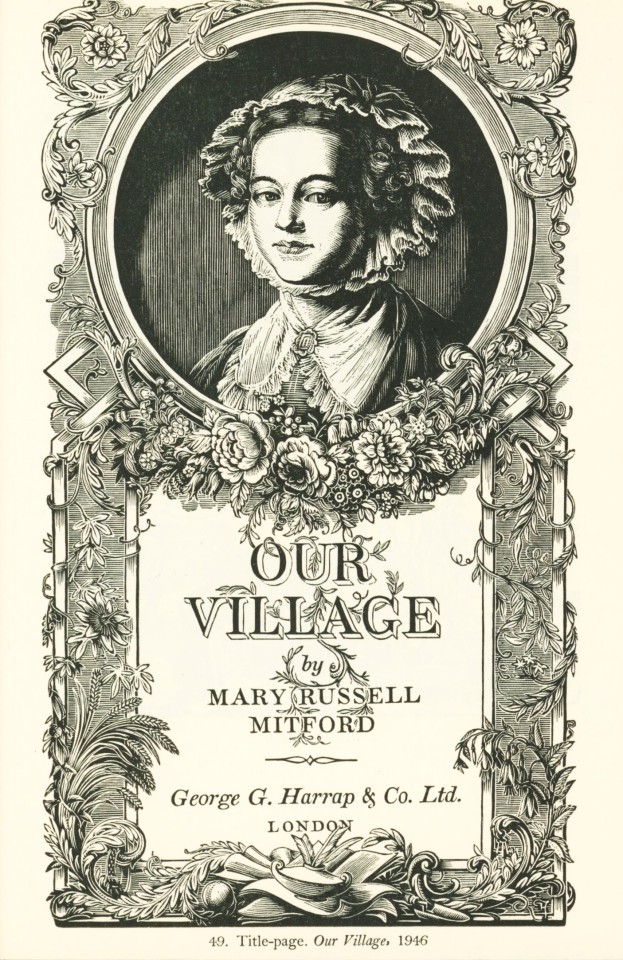


Wood Engraving Wednesday
Engraved Title Pages by Joan Hassall
These engraved title pages by the prolific English wood engraver and book illustrator Joan Hassall (1906-1988) are from The Wood Engravings of Joan Hassall, with an introduction by the Scottish book and type designer Ruari McLean, published in London by the Oxford University Press in 1960.
Hassall was one of the most sought-after wood-engraving illustrators of her generation, yet her process was slow and deliberate, but also intuitive. Ruari McLean writes:
She does the minimum of drawing on her blocks first, putting down only the bare outlines of the composition, so that the detail of the design is developed by the graver, almost as a series of afterthoughts. She often engraves a block completely, only to find that it does not satisfy her conception: she will then offset the design into a fresh block and entirely re-engraved it. At this stage, an exasperated publisher is often waiting in great impatience, so it implies a very firm resolve indeed not to let a block go until she is satisfied.
The title page for Devil's Dyke is for a book by her brother, the actor, dramatist, and poet Christopher Hassall (1912-1963), with whom she was very close.
Our copy of The Wood Engravings of Joan Hassall is another gift from our friend Jerry Buff.
Read more about and view more engravings by Joan Hassall.
View more posts with women wood engravers
View more posts with wood engravings!
#Wood Engraving Wednesday#wood engravings#wood engravers#women wood engravers#Joan Hassall#The Wood Engravings of Joan Hassall#Ruari McLean#Oxford University Press#title pages#engraved title pages#Jerry Buff
77 notes
·
View notes
Text


Oxford University Press USA is ON STRIKE over unfair labor practices as of 6/18/24!
The OUP USA Guild is protesting classic union-busting tactics including denying raises to unionized staff, moving work away from the bargaining unit, and illegally laying off their Unit Chair after 15 years (!!!).
Please check out the OUP USA Guild's linktree or Instagram for more information. At this time they have not called for a boycott, but there is a petition you can sign.
#I can't paste the petition link on mobile for some reason but it's on the link tree#bookblr#Oxford university press#labor rights#union busting is disgusting
44 notes
·
View notes
Text

!NEW RELEASE!
Title: Sylvia Plath: A Very Short Introduction
Author: Heather Clark (author of Red Comet: The Short Life and Blazing Art of Sylvia Plath, 2020)
Publication date: already out in the UK, US: 21 November 2024
Publisher: Oxford University Press
Pages: 144
Image source (cover & description): https://global.oup.com/
About the book:
Provides a concise introduction to one of the most influential and iconic American writers of the twentieth century, exploring the major events in Plath's life and themes in her work
Reframes Plath's work within the broader context of poetic confessionalism, biography, feminism, politics, and mental illness
Written by a leading expert on Sylvia Plath
Part of the Very Short Introductions series - over ten million copies sold worldwide
...
It's the perfect book for you if you have just discovered Sylvia Plath and want to get a quick overview of her life and work. It's also a great as a first book if you want to introduce her to someone else. Or if you want to brush-up your knowledge!
#sylvia plath#sylviaplath#new release#heather clark#oxford university press#red comet#The Short Life and Blazing Art of Sylvia Plath
10 notes
·
View notes
Text
You Nakai — Reminded by the Instruments: David Tudor's Music (Oxford University Press)

You Nakai's Reminded by the Instruments: David Tudor's Music is a mammoth and vividly detailed analysis of the late David Tudor's trajectory from boy prodigy on the church organ to one of the first purveyors of live electronic music, with stops along the way as go-to pianist interpreting scores from most of the major composers of experimental music through the 1950s. Clocking in at 768 pages with over 300 images of Tudor's performances, instruments, schematics and block flow diagrams, the book goes into intense detail and will not be an easy read for those looking for a mere chronology of Tudor's work. Nor will the book please those in search of anecdotes about Tudor's personal life. As the title implies, this book is mainly about the instruments Tudor developed and used in his live-electronic work from the early 1960s until his death in 1996.
The very notion of what Tudor considered an instrument takes Nakai's research down a long, and at times, circuitous path through numerous interviews with former friends and colleagues, such as Gordon Mumma and Pauline Oliveros, to mining the archives of the David Tudor Papers at the Getty Research Institute in Los Angeles, the David Tudor Collection at Wesleyan University in Middletown Connecticut (with over 500 instruments; 150 of which were built by Tudor himself) and the Merce Cunningham Dance Foundation Records at the New York Public Library. This trove of material included receipts, crumpled notes, random scribbles on the backs of envelopes, empty packages of electronic components, clippings from hobby electronics magazines, letters from strangers, train and bus tickets, circuit plans, photos, tapes of interviews, video recordings and bills of material for various electronic projects.
If this at all sounds overwhelming, you'd be more than right in thinking so. And it seems this was also the case for Nakai, who at the beginning of his work on the book, which went from 2007-2019, knew next to nothing about analog electronics. The actual idea of writing about Tudor's work stemmed from a random peek into the archives at the Getty Research Institute when Nakai was doing research there for another project. This led to Nakai spending the next 12 years of his life studying and writing about Tudor's work, which for Nakai most resembled a black box that, in order to be fully understood, demanded to be dismantled and looked at from the inside. To achieve this, Nakai employed a method of research he termed reverse-musicology, in which he tried to approach Tudor's materials as Tudor would have approached them himself. But what did this mean exactly?
Part of the answer lies in Nakai's chosen title for the book, taken from a fragment of the Walt Whitman poem A Song for Occupations, which Tudor had scribbled in one of his notebooks around 1955: All music is what awakens from you when you are reminded by the instruments. For Tudor, being reminded by the instruments meant, in his words, Observing electronic components and circuitry as individual and unique, rather than as servomechanisms, revealing their personalities, directly related to the particular musician involved with them. The deeper this process of observation, the more the components seem to require and suggest their own musical ideas, arriving at that point of discovery, always incredible, where music is revealed from the 'inside,' rather than 'outside.'
This quote is one of the few directly written by Tudor in Nakai's book. Tudor was not known for talking much about his work, if at all. He was often viewed as something of an enigma or living puzzle by his friends and colleagues. One of Nakai's main premises for working on this book was to approach Tudor's materials as Tudor did himself. Which in Tudor's case would be how he went about trying to solve the particular puzzle involved with interpreting a musical object, composition or performance. As John Cage once said about his friend, favorite musician and interpreter of his work, Tudor's interest in puzzles invited the whole thing of indeterminacy. To these ends, Nakai devised a two-fold method of approaching the massive puzzle that was Tudor's work: 1) Observe the given material thoroughly in an unbiased way until it reveals its own nature. 2) Bias the subsequent approach to the material based on this nature.
Nakai went to herculean lengths to understand the nature of Tudor's instruments. At the Wesleyan University collection he opened up the 500 instruments stored there and copied down their circuit plans, without at first even understanding what he was looking at. He took photos of nearly every single bit of material at the Getty Research Archives and transcribed all the recordings of Tudor's interviews to be found in the New York Public Library. Through this research Nakai hoped the nature of Tudor's instruments and their place in his work as a composer and performer would reveal themselves.
Tudor himself would have to be counted as the main instrument in Nakai's study. In 1959 the Italian composer Sylavno Bussotti sent Tudor a new collection of pieces entitled Five Piano Pieces for David Tudor. As Bussotti explained in a letter to Tudor, the pieces were not meant as an homage to Tudor but that they were written for Tudor the instrument, as one might compose a piece for orchestra or string quartet. Even before Bussotti's piece, many composers, including John Cage, Morton Feldman and Earle Brown, had written their pieces explicitly with Tudor in mind. They were composing in the context of how David Tudor would solve the puzzle of interpreting their pieces, many of which were graphical scores that gave an enormous amount of leeway in how they could be realized.
Tudor also viewed himself as an instrument, though this notion took root many years before composers began considering him as one. Tudor's lifelong interest in the work of the Austrian occultist Rudolph Steiner, who once wrote, Each human being was composed as a musical instrument, helped Tudor see the connection between the physical nature of the material he was working with and a metaphysical concern of his own nature. This side of Tudor's work, like many aspects of his life, was little known during his lifetime. Profoundly influenced by Steiner's book, The Inner Nature of Music and the Experience of Tone: The Occult Basics of Music, Tudor even went so far as to become a member of the Anthroposophical Society in 1957. It was this occult approach to understanding the nature of musical objects, as well as himself, which guided Tudor through much of his work.
Nakai faced many challenges in writing about Tudor's work, and not just because Tudor himself spoke or wrote very little about what he was doing. Beyond the hurdle of Tudor's reticence was a problem of concept that Tudor brought to the notions of composer vs. performer, score vs. instrument and composition vs. improvisation. Tudor dismantled, expanded and sometimes just downright ignored these categories. There was also the issue of, as Nakai terms it, Tudor's low threshold of boredom, moving in the course of his life from organ to piano to bandoneon and then electronics. Even when Tudor finally arrived at his phase of working solely with electronics, this was often coupled with visual elements, such as his decades-long work with the Merce Cunningham Dance Company or many projects in collaboration with visual artists.
"Reminded by the Instruments" leaves the door open to many other sides of Tudor's life, which Nakai freely admits to omitting in his opus. This would include, for example, Tudor's contact with Borbetomagus and what he thought about the nascent noise music scene in the United States — something Tudor referred to as pop groups! Nakai also avoided spending much time on areas covered in other books about Tudor, such as writing about Rainforest (probably Tudor's most famous piece), his piano realizations in the 1950's or participation at the Darmstadt seminars and Black Mountain College events with John Cage. The main focus here is the instruments and the transitions during Tudor's life. In particular, how Tudor went from being a performer of other people's music to being a composer of his own.
And this is often what is referred to as the great mystery surrounding Tudor's career: why did he stop performing on piano? Was it, as he (half?)-jokingly recounted to Alvin Lucier, Alcohol goes very well with electronic music; it's not so good with piano playing! Or, as he recounted in a joint interview with John Cage in 1972 on KPFA radio, I got tired of the sound of it. And I had a great desire to not have to hear it anymore! As much surrounding Tudor's life, this will probably remain a mystery. Just as his transition from interpreter of other people's work to being a composer in his own right. When did this happen, how? Part of the difficulty in answering such questions lies in the fact that Tudor redefined what composition meant. Or what performance meant. Or even what an instrument was. Virtually every aspect of Tudor's work went against traditional concepts. Which isn't to say that Tudor was at all interested in what all these concepts meant, traditionally or experimentally. Rather, the very nature of the material Tudor worked with caused these concepts to acquire new meaning.
Aside from the incredibly detailed look at Tudor's instruments and his approach to electronic music performance, the book offers an ancillary view of experimental music from the 1950's to the time of Tudor's death in 1996, touching on indeterminacy, prepared piano techniques, graphical scores, the introduction of live-electronics (as opposed to tape playback of pieces composed in a studio) and sound installation. So many of the ideas discussed in this book that Tudor began working with very early on are in such common usage today that we might as well imagine they'd always been with us. This would include no-input systems, field recordings, sound visualization, hardware hacking, circuit bending and sound art, just to name a few. "Reminded by the Instruments" provides the mind-boggling perspective that David Tudor had his hand in nearly all these developments, back in a time when there was no internet. When circuit diagrams had to be clipped out of magazines like Popular Electronics and everything Tudor needed to realize his ideas had to be built from scratch, either by himself or by commissioning electrical engineers to do it for him.
Nakai sums up his effort in Reminded by the Instruments as not so much to produce a faithful representation of Tudor's work, but to coordinate the scattered pieces of the puzzle to create a lively realization that future readers may use for this or that purpose. In which case, this book will provide virtually endless inspiration for anyone trying to find their own way as composers or performers or something else as yet to be defined until they themselves discover what that is.
Jason Kahn
#you nakai#reminded by the instruments#david tudor#oxford university press#jason kahn#bookreview#dusted magazine
7 notes
·
View notes
Text

Arika Okrent: Highly Irregular: Why Tough, Through, and Dough Don't Rhyme and Other Oddities of the English Language (2021)
#akira okrent#sean oneill#highly irregular#english#language history#grammar#linguistics#oxford university press
7 notes
·
View notes
Text

Got rizz? Tom Holland memes propel popularity of 2023 word of the year
Gen Z slang for charm or attractiveness sees off ‘Swiftie’, ‘situationship’ and ‘prompt’ in judges’ decision
Do women twirl their hair when they’re around you? Do men laugh loudly at your jokes? Have you noticed you’re particularly good at chatting people up? Then you’ve got rizz.
If you’re unfamiliar with the word then get to know it, because “rizz” has been named as the word of the year by Oxford University Press (OUP), the world’s second oldest academic press and the publisher of the Oxford English Dictionary.
The gen Z slang for “style, charm or attractiveness” or “the ability to attract a romantic or sexual partner” beat out other contenders such as “Swiftie” (an enthusiastic fan of Taylor Swift), “situationship” (an informal romantic or sexual relationship) and “prompt” (an instruction given to an artificial intelligence program).
Rizz is believed to come from the word “charisma”, and can be used as a verb, as in to “rizz up”, which means to attract, seduce, or chat someone up, OUP said.
The word was first recorded in 2022 and went viral in June this year after the Spider-Man actor Tom Holland declared in an interview: “I have no rizz whatsoever. I have limited rizz.” He later explained he won over his girlfriend, the actor Zendaya, by playing the “long game”.
As Holland’s comments spawned endless memes, overall usage of the word surged by a factor of about 15, according the publisher. Today, the word is used massively online, with billions of views of the hashtag “rizz” on TikTok.
OUP said the word had “boomed on social media”, showing how the internet can propel initially fringe language into the mainstream. “This is a story as old as language itself, but stories of linguistic evolution and expansion that used to take years can now take weeks or months,” it said.
It said the growth of rizz “speaks to how younger generations create spaces – online or in person – where they own and define the language they use. From activism to dating and wider culture, as gen Z comes to have more impact on society, differences in perspectives and lifestyle play out in language, too.”
This year’s shortlist of eight words was selected by language experts at OUP. That list was then put to a public vote in late November, reducing the field to four finalists, before Oxford lexicographers made the final decision.
More than 30,000 word lovers helped to decide head-to-head competitions between pairs of words or phrases. They selected “rizz” over “beige flag” (a character trait indicating that a partner or potential partner is boring).
The other words that didn’t make the final cut were “parasocial” (a relationship characterised by the one-sided, unreciprocated intimacy felt by a fan or follower for a well-known figure), “heat dome” (a persistent high-pressure weather system over a particular geographical area), and “de-influencing” (the practice of discouraging people from buying particular products or reducing their consumption more generally).
Last year the public was given the opportunity to choose the overall winner, and an overwhelming 93% voted for “goblin mode” – a slang term describing “unapologetically self-indulgent, lazy, slovenly or greedy” behaviour.
Casper Grathwohl, the president of Oxford Languages, said witnessing thousands of people debate and discuss language “really highlights the power it has in helping us to understand who we are, and process what’s happening in the world around us”.
Given that “goblin mode” resonated with so many after the pandemic, Grathwohl added, “it’s interesting to see a contrasting word like ‘rizz’ come to the forefront, perhaps speaking to the prevailing mood of 2023, where more of us are opening ourselves up after a challenging few years and finding confidence in who we are.”
Previous words of the year – chosen by Oxford lexicographers – include “vax” (2021), “climate emergency” (2019) and “selfie” (2013).
Do you know these gen Z slang terms?
POV Short for “point of view”, referring to one’s point of view of a certain situation, including a physical standpoint, an opinion or attitude.
Lore Referring to background information about a person, typically secret or random pieces of information.
Tea Meaning gossip or inside information, used in phrases like “spill the tea”, ie share the juicy information you have.
Hits different When something feels special, or appeals to you in a unique way, it “hits different”.
Sneaky link A secret meeting between two people romantically interested in each other, commonly used to refer to a hookup but also to describe a friends-with-benefits relationship.
Heather Refers to a very desirable person who everyone likes, derived from the Conan Gray song Heather, about being in love with someone who is in love with a girl called Heather.
Pick Me Girl A woman who claims or acts as if she is unlike most other women to gain attention from men.
Slept on To be ignored, overlooked or not appropriately respected.
Girl dinner A low-maintenance way to eat, by picking (usually insubstantial) items from the fridge and arranging them in an aesthetically pleasing way on a plate.
Canon event A trend that started after the release of Spider-Man: Across The Spider-Verse, referring to a pivotal moment that changes the course of one’s life and therefore cannot be interrupted.
#Tom Holland#Rizz#Oxford University Press#rizz has been named as the word of the year#the guardian#zendaya#tomdaya
13 notes
·
View notes
Text

#non-aggression#ashley montagu#tim gaydos#1970s#non fiction#hardback#dust jacket#vintage design#oxford university press#oup
6 notes
·
View notes
Text
How is it an open access book if the ebook is $18.99 and I cannot find the PDF copy that is mentioned in the Amazon description? Like, what, I'm only able to read this book for free on Google books? What is with this?
2 notes
·
View notes
Text
"There is no guarantee that future conceptions of democracy will continue to be more inclusive."
-Naomi Zack
Zack, Naomi. 2023. "Democracy A Very Short Introduction". Oxford University Press: 5.
#Naomi Zack#Oxford#Oxford University Press#Democracy#Political Science#Poli Sci#Poli#Quote#Univeristy#Scholar#Acedemia#Scholarly#Equality
2 notes
·
View notes
Text

From: Langston Hughes, Black Misery, Illustrations by Arouni, Introduction by Jesse Jackson, Afterword by Robert G. O'Meally, Oxford University Press, New York, NY, and Oxford, 1994 [first published by Paul S. Eriksson, New York, NY, 1969]
«Misery is when you heard on the radio that the neighborhood you live in is a slum but you always thought it was home»
#graphic design#poetry#book#langston hughes#arouni#jesse jackson#robert g. o'meally#paul s. eriksson#oxford university press#1960s#1990s
43 notes
·
View notes
Text



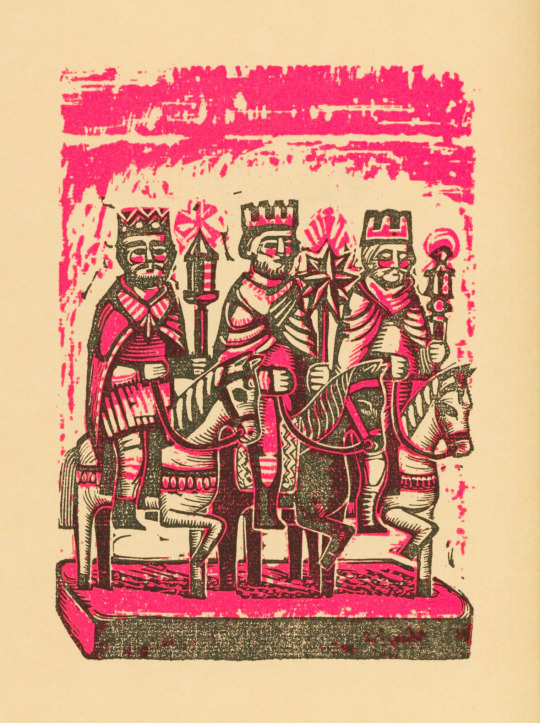
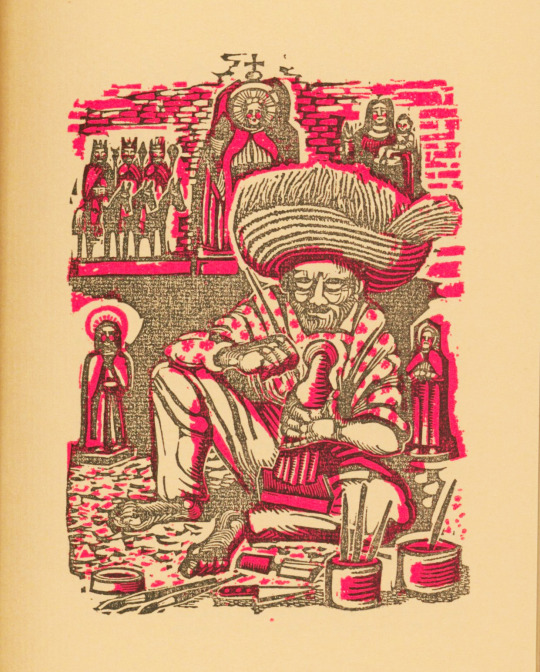





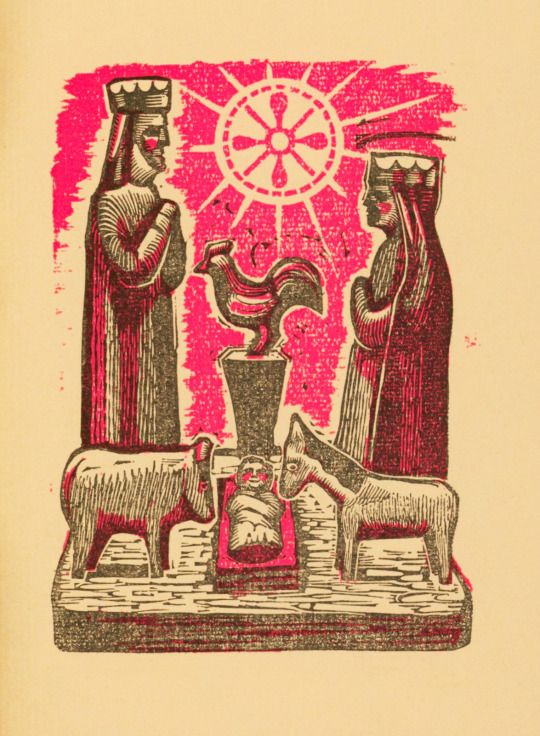
Merry Christmas!
Or as they say in Spanish, Feliz Navidad! Today we celebrate the Christmas holiday with a festive book, Land of Two Christmases, which was published by Oxford University Press in 1965 with 360 copies held for distribution to the Typophiles. The text was written by Harriett Philmus Pitt and discusses the various Christmas traditions celebrated in Puerto Rico, where the books says it is celebrated in both the American and Spanish styles—though I would argue that Puerto Rico has a style all it's own! You can learn all about Christmas and related celebrations in Puerto Rico on the Discover Puerto Rico website.
The illustrations are by Erwin Schachner and were printed using photo-engravings of original linoleum prints. The text was set in Caledonia and letterpress printed on tan laid paper by Marbridge Printing Company, Inc. The book is printed in black and bright pink, making it quite festive though not what most would normally consider to be Christmas colors.
Merry Christmas to all and to all a good night!
View Christmas posts past.
-- Alice, Special Collections Department Manager
#Christmas#Land of Two Christmases#Oxford University Press#Typophiles#Harriett Philmus Pitt#Puerto Rico#Erwin Schachner#linocuts#Marbridge Printing Company#holidays
56 notes
·
View notes
Text

OXFORD UNIVERSITY UNION-BUSTING PRESS
Remember Oxford University Press's US workers going on strike over unfair labor practices a few months ago? It got worse!
The following statement was posted on the OUP USA Guild's Instagram stories (@ oupusaguild) around 5:30 PM today 9/10/24. I've transcribed it and will post screencaps under a cut for verification.
3 weeks after ratifying our first contract, OUP has notified 13 members of the OUP Guild bargaining unit that their entire US teams are being laid off. Despite the increasingly heavy workloads of these teams, OUP claims that the positions are no longer needed because there "is not enough work" and it can be moved to the UK. We believe this layoff is a violation of our collective bargaining agreement and we have filed a grievance. The layoff affects BU [bargaining unit] and non-BU staff that make up the entire US/North America Design Team and the US Content Transformation and Standards Team at OUP. The 13 BU members are a senior group of employees who have about 180 combined years of employment at OUP (an average of 14 years per person). Our UK teammates are expected to take on the burden of this work in addition to their heavy workloads. This is a transfer of historical Bargaining Unit work out of the Bargaining Unit, and no alternative job placements have been offered to the affected BU members. The expertise, loyalty, and dedication to OUP's mission from within this group is irreplaceable. Our message to OUP: REVERSE THIS DECISION and REINSTATE OUR JOBS
A few notes from me: For the uninitiated, management often threatens mass layoffs if workers organize. This is classic retaliation by OUP. The statement says 13 bargaining unit members were laid off but also that non-BU staff were affected, so this probably means their managers were fired too. And an average of 14 years a person means many of these were workers who had long careers. They showed loyalty, and OUP showed them the door.
The OUP USA Guild has not made any call to action as of yet, but it sounds like they will in the future. Stay tuned.









3 notes
·
View notes
Text


4 December 2023

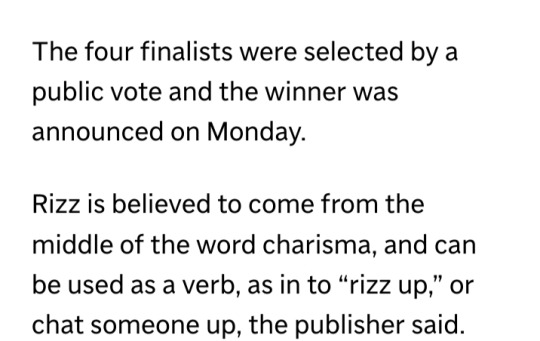
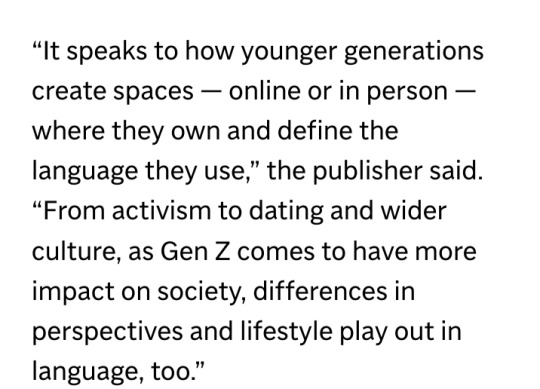

#Rizz#Oxford Dictionary#Oxford University Press#Word of the Year#Gen Z#Generation Z#words#lexicographers#Oxford English Dictionary
5 notes
·
View notes
Text
The Philosophy of Mind by Jonathan Glover (Editor) - A Review
My Rating: 3/5Genre: Philosophy/PsychologyPages: 162 (Paperback)Publisher: Oxford University PressDate of Publication: 13 January 1977 Series: Oxford Readings in Philosophy Review Reviewing this one in a manner different from my other reviews because1) This is a scholarly book that I had no business reading and now I am going to review it.2) I checked out two books from the Sahitya Akademi…

View On WordPress
#book review#Compilation#Editor#Jonathan Glover#Non Fiction#Oxford Readings in Philosophy#Oxford University Press#Paperback#Philosophy#Psychology#Sahitya Akademi Library#Shaina Reviews#Shaina&039;s Musings#The Philosophy of Mind
2 notes
·
View notes
Text
"Surprising angles are always appearing..." #myreading @OxUniPress #zola
Oxford University Press have been doing a sterling job of releasing some really interesting books in their ‘My Reading’ series, one which features authors writing about their favourite books and authors. I recently wrote about a title focused on Octavia E. Butler, and there are volumes on Proust and Colette, to name just two. A new release, out today, takes a look at the author Emile Zola;…

View On WordPress
0 notes